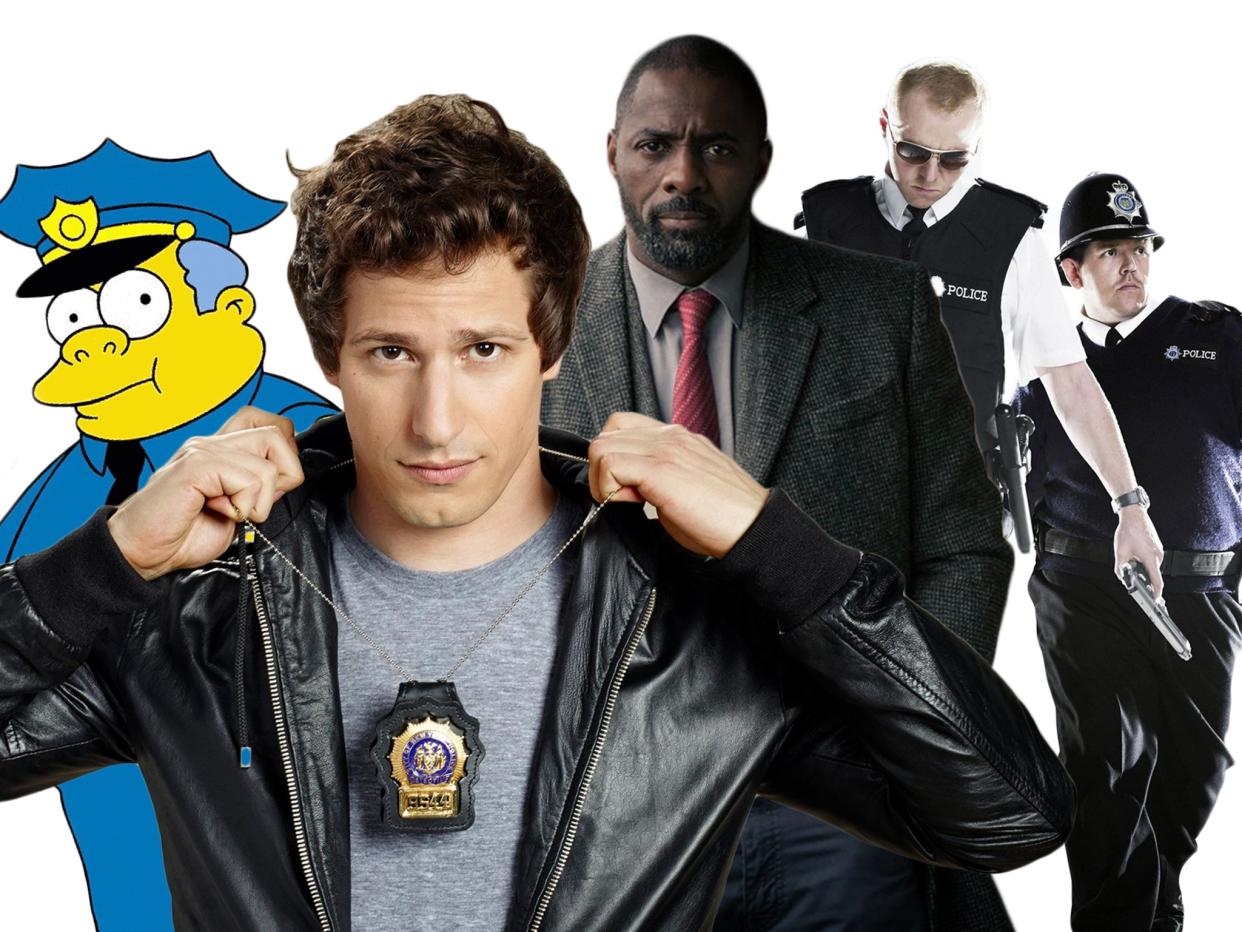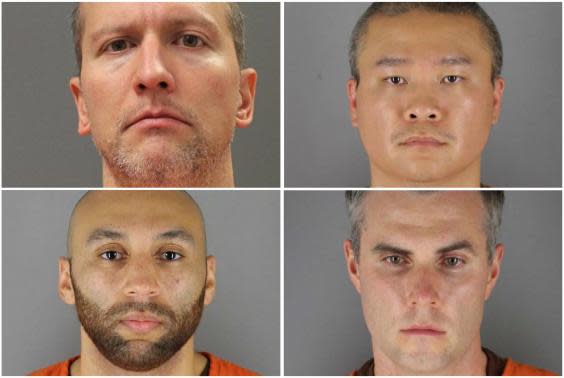Copaganda: Why film and TV portrayals of the police are under fire

When did you first see a police officer on TV? What did they look like? My first memory of seeing an officer on the small screen was when I was a toddler. It was Mr Plod, in Enid Blyton’s Noddy’s Toyland Adventures.
Mr Plod has a round face, rosy cheeks and a button nose, and spends his time putting wayward citizens of Toyland in jail. At roughly age three, I doubt I knew much about the police or prisons, but the BBC’s Noddy taught me that jail is somewhere that bad people go. In one episode, Mr Plod in Jail, Mr Plod inadvertently locks himself in his own jail cell and is rapidly driven to an existential crisis, singing: “I was bad, very bad – ask me how I know. I wound up where only truly awful people go.”
Images of police and prisons are deeply embedded in pop culture, and the “police PR machine”, as American civil rights leader Rashad Robinson calls it, starts in childhood. After the murder of George Floyd at the hands of US police and the global protest that followed, anti-racist audiences simultaneously turned their attention to representations of the police in the media. Last week, Brooklyn Nine-Nine star Andy Samberg told fans of the US cop comedy that the creators are taking a “step back” before the show’s eighth season to work out how they can make a show about police that they feel “morally OK” about. The other shows that came under scrutiny spanned all types and audiences, from COPS, the reality show that ran for 32 years and was cancelled amid protests about Floyd’s death, to Paw Patrol, a CGI animated kids show about six police puppies, who fight crime in the fictional Adventure Bay community. Antiracists criticised these shows, also dubbed “copaganda”, as glamorising and sensationalising policing, as well as misleading the general public with regards to how the criminal punishment system actually works.
On our screens, we are shown the “badass” variety of police aplenty – from Luther, to Law & Order, to Line of Duty. These officers are often presented as dominant, heroic agents of justice, who catch “bad guys” and lock them away. Then there are the more insidious portrayals, which present the police as soft and cuddly, or as Tom Scharpling, who produced four seasons of the San Francisco-set private detective show Monk, described as “lovable goofball[s]”. Often these goofballs, much like Mr Plod, are a little incompetent, but we are supposed to adore them for it. They can come in the form of satire, like the protagonists in Scot Squad, The Thin Blue Line or Feel the Force. In Brooklyn Nine-Nine, the overly serious Captain Raymond Holt is juxtaposed against a team of officers who are carefree, childish, or laughably bad at their jobs. Meanwhile, in The Simpsons, Officer Wiggum spends most of his time watching cartoons and snacking on doughnuts. And 21 Jump Street and police-parody Hot Fuzz both see pairs of white men bond through awkward slapstick japes as they attempt to put people in handcuffs.
The crimes and proceedings in police comedies are often silly; in Hot Fuzz, there’s a swan chase, meanwhile in Brooklyn Nine-Nine, our protagonist Jake Peralta makes suspects sing the Backstreet Boys in a line-up. These portrayals also find humour in the relative mundanity of policing – in 21 Jump Street, Jenko remarks that he “thought this job would have more car chases and explosions and s***”. In moments like this, police comedies actually expose the myth created by their drama-counterparts like COPS – that over 90 per cent of police callouts look nothing like the action-packed climaxes we see on TV. The punchline lies in the fact that much of policing is actually “boring” and bureaucratic.
Even police themselves admit this to be true – last year, Olivia Pinkney, Chief Constable of Hampshire Constabulary, remarked on the popular British police show Line of Duty. “It’s lauded for being great telly,” she told The Daily Telegraph. “I wouldn’t say it’s lauded for being accurate. It’s nothing like what we do, not at all, far from it.” Prison abolitionist Mariame Kaba elaborated on this idea in an essay for The New York Times last month: “Police officers don’t do what you think they do. They spend most of their time responding to noise complaints, issuing parking and traffic citations, and dealing with other noncriminal issues.” What’s more, they don’t do it as effectively as we’re led to believe: in England and Wales only 9 per cent of crimes see suspects charged or summonsed. Yet many of our biggest hitting crime dramas like Luther, Sherlock and Line of Duty would lead you to believe that the police spend most of their time solving murders.

On the flipside, Kaba has pointed out that in the cases where the police aren’t doing too little, they are doing far, far too much. As we have seen time and time again in candid footage on our feeds, it is evident how quickly police can escalate mundane situations, in ways that disproportionately hurt black people. A stop and search becomes a distressing scene where a mother ends up in handcuffs, or a reported counterfeit bill becomes a murder. But racialised violence is largely absent from police narratives on screen. Particularly in the case of Brooklyn Nine-Nine, we see a diverse police department tackling perpetrators who are overwhelmingly white; and officers only solve murders, they do not commit them. In comedies, humour often serves to obscure how the police disproportionately punish people of colour. Take Brooklyn Nine-Nine – in its second season, a task force is set up to take a new designer drug named “Giggle Pig” off the streets of New York. As Vulture reporter Harry Waksberg points out: “Giggle Pig is a cute name for cops to say… in real life, of course, police making nonviolent drug arrests has led to the systematic and genocidal destruction of communities of colour.”
If, like me, you were presented with images of police and prisons from before you could talk, it might seem impossible that a world could exist without them. But dismantling the police’s stronghold on our collective psyche means dismantling the pop culture that has for so long portrayed them as a positive, non-violent societal force. As the Color of Change’s report on policing on TV suggests: if police are to be portrayed on screen, firstly, there should be people of colour in the writers’ room, and people who have been on the receiving end of the criminal punishment should be consulted. Secondly, the realities of policing should be made transparent to viewers – this means getting rid of both the badass car chases and explosions, and the socially awkward antics of buddy cop duos.
In its coming season, I’m intrigued to see how Brooklyn Nine-Nine will attempt to redeem itself from the police PR-machine – although my suspicion is that it cannot. Nonetheless, one day, I hope that we will look back on both our crime-fighting “heroes” and our “lovable goofballs” as insidious archetypes of a bygone era.
Read more
Reading about racism won’t make you an ally – but it’s a step forward
only 9 per cent of crimes see suspects charged or summonsed
distressing scene where a mother ends up in handcuffs


